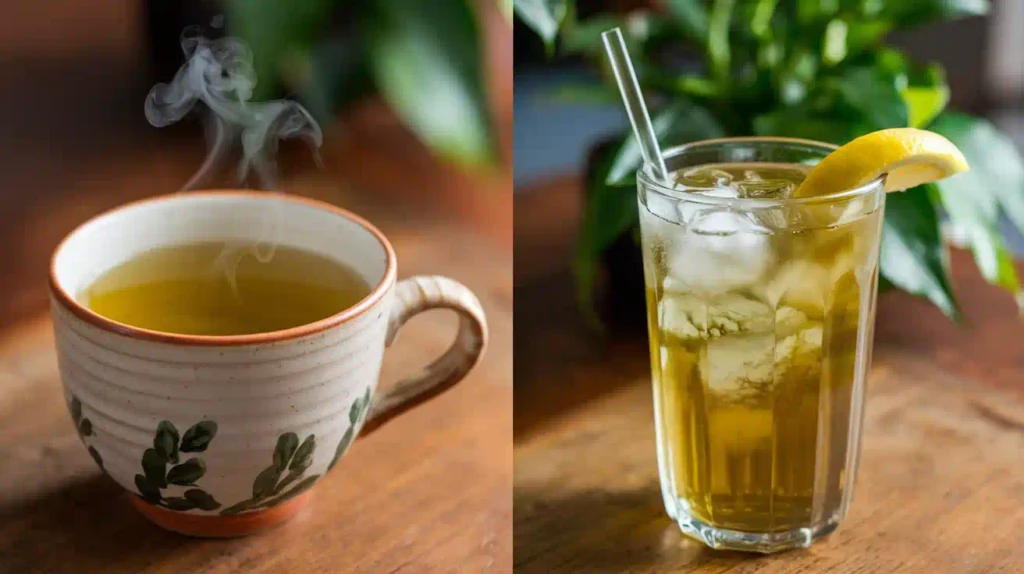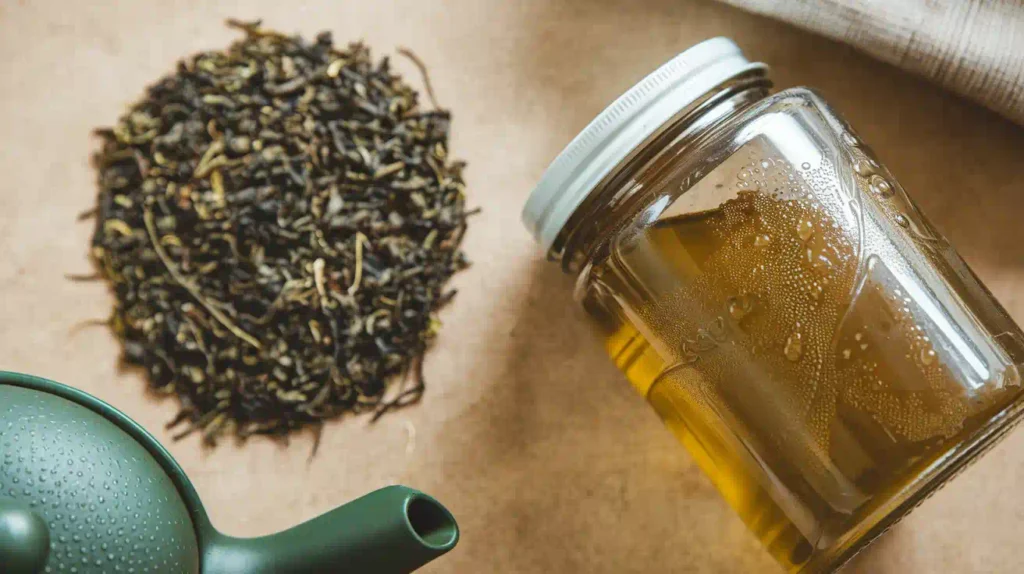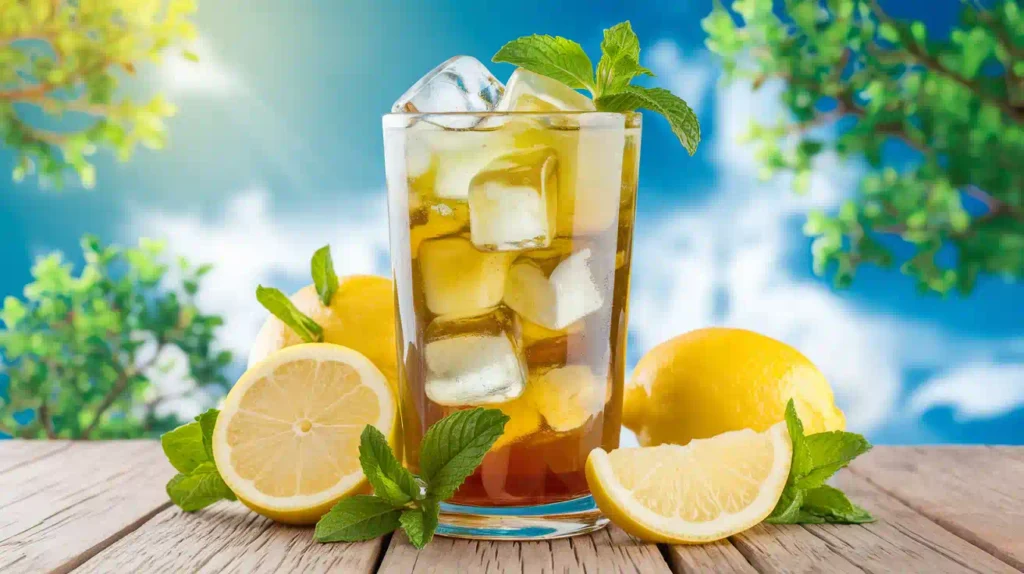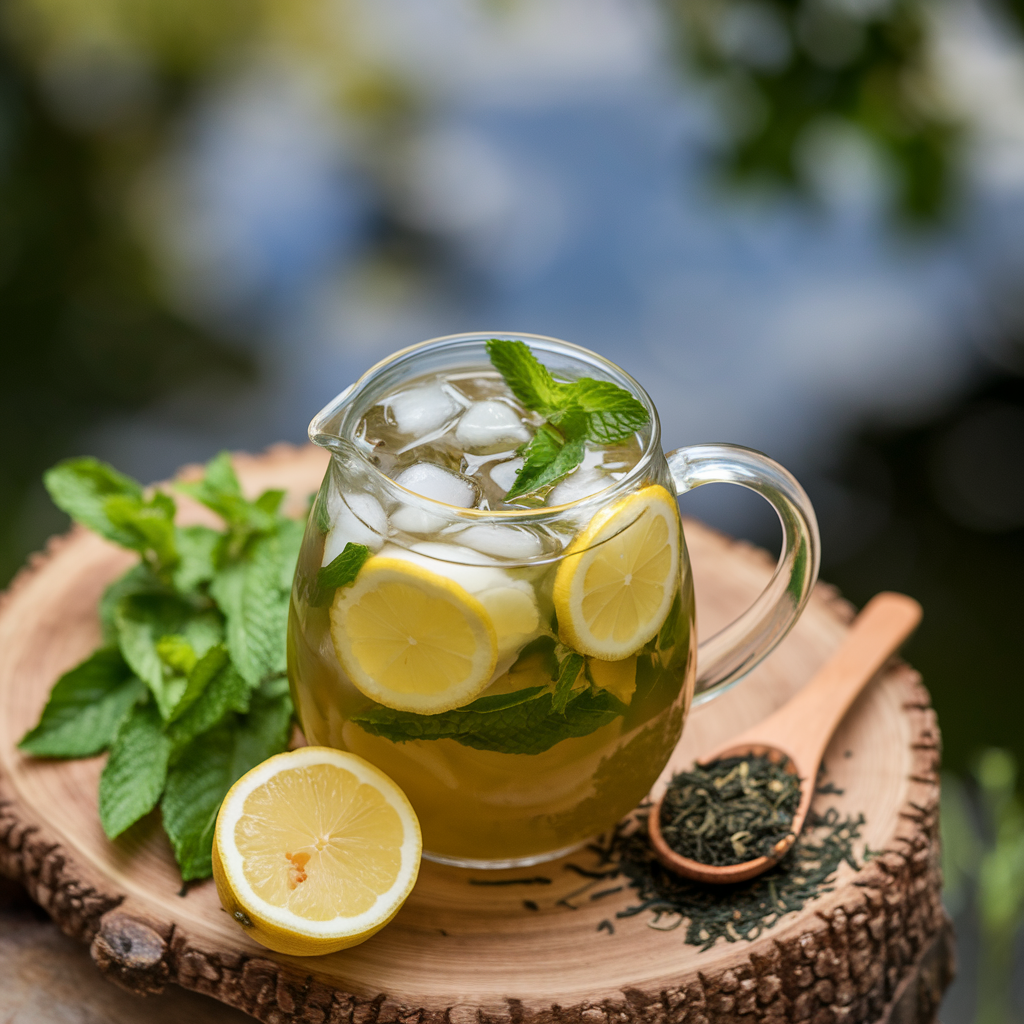Green tea has been a popular beverage for centuries, praised for its refreshing taste and numerous health benefits. But what happens when you take your steaming cup of green tea and chill it down? Does it still pack the same punch? Let’s dive into the cool facts about cold green tea! 🫖❄️
Table of contents
- Introduction: Understanding Green Tea and Its Benefits
- The Science Behind Green Tea’s Health Benefits
- Does Temperature Impact the Effectiveness of Green Tea?
- Why Some People Love Cold Green Tea
- Common Problems When Drinking Green Tea Cold
- How to Brew Green Tea for Maximum Benefits
- Best Practices for Storing and Consuming Cold Green Tea
- Popular Additions to Enhance Cold Green Tea
- Green Tea Myths Debunked
- Expert Opinions on Cold Green Tea
- Real-Life Benefits of Cold Green Tea
- Conclusion: Is Cold Green Tea Right for You?
Introduction: Understanding Green Tea and Its Benefits
A Brief History of Green Tea
Green tea isn’t just a modern-day health trend—it has a history steeped in tradition. Originating in China over 4,000 years ago, green tea has long been celebrated for its medicinal properties. The drink was initially used as a tonic to boost energy and promote healing, and it quickly became a staple in various cultures, particularly in Asia.
Fast forward to today, green tea has become a global phenomenon. Whether served hot or cold, it’s adored for its subtle, earthy flavor and its role in promoting wellness. But here’s the question: does it work just as well when it’s not hot?
The Science Behind Green Tea’s Health Benefits
Antioxidants in Green Tea: What Are Catechins?
One of the key reasons green tea is so effective lies in its antioxidant content, especially catechins. Think of antioxidants as your body’s superheroes 🦸♂️—they fight off harmful molecules known as free radicals, which can damage your cells and speed up aging.
Among these, epigallocatechin gallate (EGCG) is the star player. It’s like the MVP of antioxidants, working to improve brain function, support weight loss, and even reduce the risk of certain diseases.
“Catechins are potent antioxidants that protect the body from oxidative stress, making green tea a powerful ally for your health.”
How Temperature Affects Nutrient Retention in Green Tea
Here’s the kicker: temperature plays a significant role in how well these nutrients are preserved. When green tea is brewed hot, the heat helps release catechins and other nutrients into the water. But does cooling the tea reduce its effectiveness?
Good news! Research suggests that as long as green tea is brewed correctly, most of its nutrients stay intact—even when it’s cold. However, brewing it incorrectly or storing it for too long may lead to nutrient loss.
Does Temperature Impact the Effectiveness of Green Tea?
Comparing Hot vs. Cold Green Tea: Key Differences
So, what’s the real difference between sipping hot green tea versus enjoying it over ice? Besides the obvious temperature change, the effectiveness largely depends on how the tea was prepared.
When green tea is brewed hot and then cooled, it retains most of its beneficial compounds. On the flip side, instant green tea powders or poorly brewed cold tea might not pack the same nutritional punch.

Studies on the Effectiveness of Cold Green Tea
Several studies have investigated whether cold green tea can still deliver the same benefits as its hot counterpart. The results? Cold green tea retains nearly all of its health benefits, provided it was brewed properly.
For example, a study in the Journal of Food Science found that cold-brewed green tea actually had higher levels of certain antioxidants compared to hot-brewed tea. Cool, right? 😎
“Cold brewing preserves the delicate catechins and other antioxidants, making cold green tea a refreshing yet effective alternative.”
A Quick Table: Green Tea’s Nutritional Profile
Let’s break down what you’re getting in a cup of green tea. Check out this table for a snapshot of its nutritional content:
| Nutrient | Quantity per 8 oz (240 ml) |
|---|---|
| Calories | 2 |
| Caffeine | 25-35 mg |
| Catechins | ~60-125 mg |
| Vitamin C | ~6 mg |
| Amino Acid (L-Theanine) | ~6-12 mg |
Why Some People Love Cold Green Tea
Cold green tea isn’t just about health—it’s also about versatility. On a hot summer day, a glass of iced green tea with a splash of lemon is like a cool breeze in a cup. It’s lighter on the palate and less bitter than hot tea, making it a crowd-pleaser for all ages.
Common Problems When Drinking Green Tea Cold
Taste and Flavor Changes in Cold Green Tea
Ever notice how some drinks taste different when they’re cold? The same goes for green tea. When chilled, green tea can lose some of its natural sweetness and develop a slightly bitter aftertaste. This change happens because cold temperatures can suppress certain flavor compounds, making bitter notes more prominent.
What’s the fix? A touch of natural sweetness—like honey, stevia, or even a squeeze of lemon 🍋—can balance out the bitterness and enhance the overall flavor.
Reduced Nutrient Extraction When Brewing Cold
Brewing green tea cold takes patience. Unlike hot water, which extracts nutrients quickly, cold water requires more time to coax out those beneficial compounds. The slower extraction process might leave some catechins and antioxidants behind.
To counter this, it’s crucial to use high-quality tea leaves and let them steep for a longer time—think 6–12 hours in the fridge for optimal results. While it’s a bit of a waiting game, the refreshing outcome is worth the effort!
“Cold brewing takes longer, but it ensures a smoother, less bitter tea with plenty of retained nutrients.”
Addressing Potential Misconceptions About Cold Green Tea
There’s a common myth floating around that cold green tea is “weaker” than hot green tea. Not true! The key lies in how it’s brewed. Cold green tea isn’t inherently less effective—it just requires the right brewing method.
So, if you’ve been avoiding cold green tea because you thought it wouldn’t benefit you as much, it’s time to rethink that. Brew it right, and you’re good to go. 💪
Chef Adam recommends this :
How to Brew Green Tea for Maximum Benefits
Step-by-Step Guide to Brewing Hot Green Tea
If you want to go the traditional route and enjoy green tea hot before chilling it, follow these steps:
- Start with quality leaves: High-quality loose-leaf green tea ensures maximum flavor and nutrients.
- Heat your water: Bring water to about 160–185°F (not boiling; too much heat can destroy catechins).
- Steep for the right time: Let the tea steep for 2–3 minutes. Oversteeping can make it bitter.
- Cool it down: Allow the tea to reach room temperature before transferring it to the fridge or pouring it over ice.

Methods to Brew Cold Green Tea Without Losing Nutrients
If you’re curious about mastering the art of brewing cold green tea, check out our detailed guide on Cold Brew Green Tea Secrets You Need To Know Now for step-by-step instructions and expert tips to make the perfect cup!
Want to skip the hot brewing step altogether? Here’s how to cold brew like a pro:
- Pick your tea: Use loose-leaf green tea or high-quality tea bags.
- Measure and mix: Add 1–2 teaspoons of tea leaves per cup of cold water.
- Refrigerate: Let it steep in the fridge for 6–12 hours. The longer, the better.
- Strain and serve: Remove the leaves or tea bags and enjoy your cold green tea.
This method not only preserves nutrients but also results in a smoother, less bitter drink. Plus, it’s incredibly refreshing on a warm day! 🌞
Best Practices for Storing and Consuming Cold Green Tea
Storage Tips to Preserve Freshness and Nutrients
Once brewed, green tea doesn’t stay fresh forever. If left in the fridge too long, it can lose its flavor and even some of its health benefits.
Here are a few tips for storage:
- Use an airtight container: This prevents oxidation and keeps the tea fresh.
- Consume within 48 hours: Beyond this, the tea may start to lose its nutrients.
- Avoid sweeteners in storage: Add any honey or sugar right before drinking, as they can alter the tea’s composition over time.
When and How to Drink Cold Green Tea for Optimal Results
Cold green tea can be enjoyed at any time of day, but it shines as a morning or afternoon pick-me-up. The caffeine gives you a gentle energy boost without the jitters, while the antioxidants work their magic on your health.
Pro Tip: Pair it with a light snack like nuts or fruits for an energizing combo! 🥜🍎
Popular Additions to Enhance Cold Green Tea
Lemon, Honey, and Other Additives: Do They Affect Effectiveness?
Adding lemon or honey to your cold green tea doesn’t just enhance its flavor—it can also boost its benefits. Lemon, for instance, helps your body absorb catechins more efficiently. Honey, on the other hand, adds a natural sweetness while offering antibacterial properties.
Here’s a quick table for inspiration:
| Additive | Benefit |
|---|---|
| Lemon | Boosts absorption of antioxidants |
| Honey | Adds sweetness and antibacterial properties |
| Mint Leaves | Adds a refreshing touch |
| Ginger | Provides anti-inflammatory benefits |
| Fruit Slices | Adds natural sweetness and vitamins |
Experimenting with Herbal and Fruit Infusions
Feeling adventurous? Try infusing your cold green tea with fruits or herbs. Blueberries, strawberries, and mint leaves are fantastic choices. They not only make your drink Instagram-worthy 📸 but also pack an extra punch of vitamins and minerals.
Cold green tea isn’t just a beverage—it’s an experience. Whether you keep it simple or jazz it up with creative infusions, there’s no wrong way to enjoy this versatile drink.
Green Tea Myths Debunked
Is Cold Green Tea Less Effective Than Hot Green Tea?
A widespread misconception is that cold green tea is “less healthy” than its hot counterpart. While it’s true that brewing methods impact nutrient retention, cold-brewed green tea holds its own in terms of health benefits.
When brewed properly, cold green tea retains most of its catechins and antioxidants. Plus, the lower temperature can preserve some delicate nutrients that might otherwise break down in high heat. So, whether you sip it hot or cold, green tea remains a health champion. 🏆
“The effectiveness of green tea isn’t determined by its temperature—it’s all about how you brew it.”
Does Green Tea Lose Its Antioxidants When Refrigerated?
Another myth suggests that refrigerating green tea causes a loss of antioxidants. The truth? As long as it’s stored in an airtight container and consumed within 48 hours, the antioxidants remain intact. However, leaving it exposed to air or light can lead to oxidation, which reduces its potency.
So, a quick reminder: Keep your cold green tea in the fridge and enjoy it fresh for maximum benefits! 🍹
Expert Opinions on Cold Green Tea
Nutritionists’ Views on Cold vs. Hot Green Tea
What do the experts say? According to nutritionists, cold green tea offers the same health perks as hot green tea, provided it’s brewed correctly. In fact, they often recommend cold brewing as a way to reduce bitterness while preserving nutrients.
“Cold brewing green tea is a gentle process that brings out its best qualities without compromising its health benefits,” notes one expert.
Tea Experts Weigh In: The Ideal Way to Enjoy Green Tea
Tea connoisseurs often highlight that the “ideal” way to enjoy green tea comes down to personal preference. Whether hot or cold, the important thing is to choose high-quality tea leaves and brew them mindfully.
One tea master put it perfectly: “Green tea is a versatile drink—let it match your mood, weather, and occasion.”
Real-Life Benefits of Cold Green Tea
Personal Stories: How People Enjoy Cold Green Tea Daily
Meet Sarah, a college student who discovered cold green tea during a heatwave. She found it to be the perfect substitute for sugary sodas. “I started drinking cold green tea every afternoon, and not only do I feel more energized, but my skin also looks clearer!”
Then there’s Mark, a fitness enthusiast who uses cold green tea as a pre-workout drink. “It’s refreshing and keeps me hydrated without weighing me down,” he shares. 💪
Cold Green Tea as a Refreshing Summer Beverage
Picture this: a tall glass of cold green tea with ice cubes, a slice of lemon, and a sprig of mint. It’s the ultimate summer refreshment—light, hydrating, and packed with health benefits. 🌞
Why opt for sugary drinks when cold green tea offers a healthier, equally satisfying alternative? With its natural antioxidants and gentle caffeine boost, it’s like a hug in a glass for your body.

Conclusion: Is Cold Green Tea Right for You?
Final Thoughts on Drinking Green Tea Cold
So, is green tea still effective when cold? Absolutely! Whether you’re drinking it hot or chilled, green tea remains a powerhouse of antioxidants and nutrients. The key is brewing it right and storing it properly.
Cold green tea is more than just a drink—it’s a lifestyle. It’s for anyone who values health, hydration, and a touch of nature in their daily routine.
Tips for Incorporating Cold Green Tea Into Your Routine
Ready to make cold green tea a part of your life? Here are some quick tips:
- Brew a large batch and keep it in the fridge for a grab-and-go drink.
- Experiment with flavors—add lemon, mint, or your favorite fruits.
- Swap sugary beverages with cold green tea for a healthier choice.
“Cold green tea is like a little green superhero in your cup—refreshing, versatile, and oh-so-good for you!” 🦸♀️🍵
Cold green tea isn’t just about quenching your thirst—it’s about nourishing your body and soul. Whether it’s a summer pick-me-up or a year-round staple, this drink is as effective as it is enjoyable. Cheers to your health and hydration! 🥂

